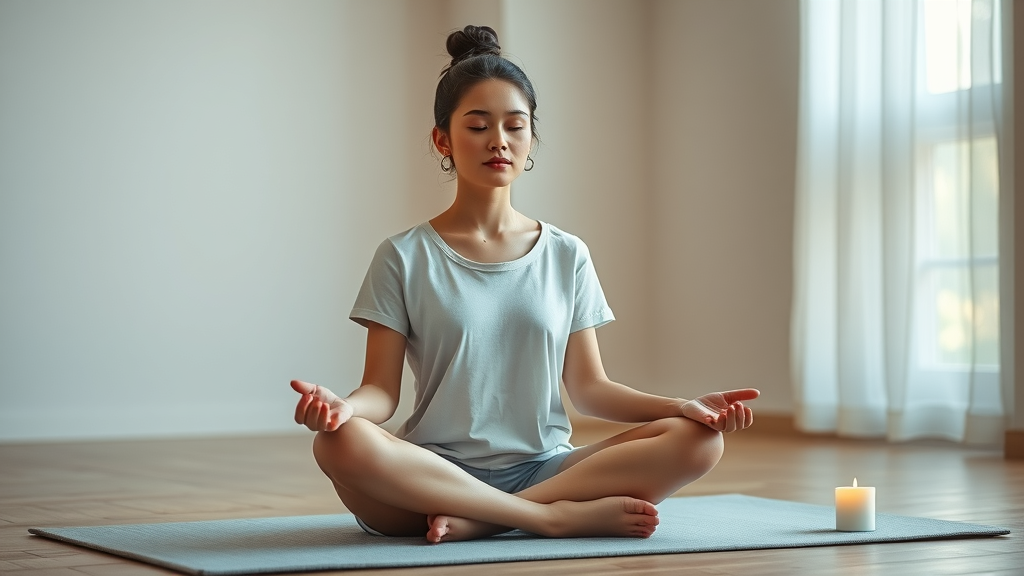Startling Statistic: Did you know that recent research shows mindfulness and meditation practices can reduce daily stress by up to 33%? In a world where our minds are constantly pulled in every direction, proven techniques like these offer a powerful and accessible path to mental clarity and calm. If you’ve ever felt your thoughts and emotions spiral or your mind wander uncontrollably, these practices may offer the transformation you crave.

How Mindfulness and Meditation Practices Can Transform Mental Health
When mental health takes a back seat, daily stress and emotional reactivity can take over. Mindfulness and meditation practices provide a structured way to bring awareness into the present moment and counteract the impact of modern stressors. By learning to pay attention to your breath, sensations, and thoughts without judgment, these practices can help you manage overwhelming emotions, increase focus, and improve your overall mental health.
Millions turn to mindfulness exercises like breath awareness and classic meditation to calm their minds and focus their attention. For example, a simple mindfulness exercise such as the body scan encourages tuning into bodily sensations, supporting both stress reduction and emotional resilience. Research supports that regular mindfulness meditation leads to fewer intrusive thoughts, greater presence, and a more balanced response to daily challenges.
Startling Facts About Mindfulness, Meditation, and Modern Stress
"Recent studies reveal that consistent mindfulness and meditation practices can reduce daily stress by up to 33%."
Today's fast-paced world encourages mind wandering and emotional overload. But evidence-based mindfulness meditation practices offer a lifeline. Unlike fleeting stress-relief techniques, mindfulness exercises—championed by renowned meditation teacher Jon Kabat-Zinn—cultivate a sustained sense of calm and clarity. They encourage us to become less overly reactive, teaching us to fully engage with the present moment and nurture our well-being from the inside out.
What You Will Learn: Practical Mindfulness and Meditation Practices for Daily Life
- The foundations of mindfulness and meditation practices
- How to initiate a mindfulness exercise and maintain momentum
- Popular mindfulness exercises and their benefits
- Simple guided meditation sessions
- Tips for integrating mindfulness meditation into busy schedules

The Science Behind Mindfulness and Meditation Practices
Modern neuroscience continues to uncover the positive effects of mindfulness and meditation practices on brain function and well-being. Studies have found that regular mindfulness meditation not only reduces stress but also supports cognitive flexibility and strengthens the capacity to manage challenging thoughts and emotions.
Research suggests that meditation practices such as the body scan and mindful listening lead to measurable improvements in mental health. For example, functional MRI scans show changes in areas of the brain linked to emotion regulation and attention after sustained mindfulness practice. These findings affirm that practicing mindfulness regularly is not just a wellness trend—it's a proven approach to better living.
The Link Between Mindfulness Meditation and Mental Health Improvements
Consistent mindfulness meditation is closely associated with enhanced mental health. By regularly engaging in practices that bring attention to the present moment, individuals report feeling less overwhelmed, less likely to let their mind wander into negative cycles, and more able to manage daily challenges. Mindfulness helps people respond thoughtfully rather than react impulsively, reducing the tendency to become overly reactive to stressful events.
Mental health benefits of mindfulness meditation can include improved sleep (making it easier to fall asleep), decreased symptoms of anxiety and depression, and higher levels of emotional well-being. This is largely because mindfulness exercises train the brain to pay attention with intention, helping practitioners become fully present in each moment.
Benefits of Mindfulness and Meditation Practices Supported by Research
Scientific support for mindfulness and meditation practices has grown dramatically in recent years. Benefits of mindfulness include stress reduction, improved focus, and even better cardiovascular health. Breath awareness, in particular, is shown to lower blood pressure, while regular engagement in guided meditation and mindful listening enhances relationship quality and mental sharpness.
The integration of these practices in clinical settings, including mindfulness-based stress reduction program initiatives, demonstrates their real-world impact. Health professionals increasingly recommend mindfulness and meditation for their clients, citing both personal experience and a robust body of research evidence.
| Practice Type | Key Benefit | Supporting Study |
|---|---|---|
| Body Scan | Reduced anxiety | JAMA Psychiatry, 2022 |
| Mindful Listening | Improved focus | Nature Communications, 2023 |
| Breath Awareness | Lower blood pressure | The Lancet, 2021 |
Top Mindfulness and Meditation Practices to Calm Your Mind
- Classic Mindfulness Exercises for Beginners
If you’re new to mindfulness meditation , start with simple, accessible exercises. Practicing mindfulness can be as easy as taking a few moments to focus your attention on your breath, conducting a guided body scan, or engaging in mindful listening with a partner. Each of these methods can quickly lower stress and bolster emotional resilience, helping you manage life’s busy moments with clarity.
Classic mindfulness exercises for beginners include breath awareness, the body scan, and brief guided meditations. You don't need special equipment or hours of free time. Even a few minutes per day, repeated consistently, can pave the way for deeper mindfulness work in the future. As you establish a routine, you’ll find it easier to redirect your attention and notice when your mind wanders—giving you more control over your thoughts and emotions.
Breath Awareness Meditation Practice

The cornerstone of mindfulness meditation is often breath awareness. This simple meditation practice involves paying close attention to each inhale and exhale, noticing the sensation of air entering and leaving the body. When your mind wanders or you become distracted, gently return your focus to your breath—without judgment.
Regular breath awareness meditation helps you become more fully present: you observe thoughts and emotions as they arise, but you don't get caught up in them. Over time, this habit minimizes emotional reactivity and encourages a calm, steady mind. Studies have demonstrated that even a short daily breath awareness session can significantly reduce stress and anxiety, making it a valuable practice for mental health.
The Body Scan: A Pivotal Mindfulness Exercise
The body scan is a foundational mindfulness exercise that helps bring awareness to different parts of your body in sequence. Begin by lying comfortably, close your eyes, and focus your attention on your toes. Gradually move your awareness up through your legs, torso, arms, and finally your head, noticing sensations (warmth, tingling, tension) without judgment.
This powerful practice, popularized by Jon Kabat-Zinn and his mindfulness-based stress reduction program, allows you to recognize areas of tension, process thoughts and emotion more mindfully, and re-engage with the present moment. Practicing the body scan before bed can also help you fall asleep more easily by addressing any residual stress in your body.
Guided Meditation for Deep Relaxation

A guided meditation is an excellent way to ease into deeper states of relaxation, especially for beginners or those whose mind tends to wander. Guided meditations are typically led by an experienced meditation teacher or a recording that offers verbal cues on where to direct your attention, how to breathe, and when to let go of tension.
Such sessions help you remain focused and present, making it easier to experience the profound stress reduction benefits of mindfulness meditation. Whether you’re facing a stressful day or want to cultivate more self-compassion, guided meditation can gently anchor you in the present moment, supporting both emotional and mental health.
Mindful Listening: Elevate Everyday Conversations

Mindful listening is the art of paying full attention to another person during a conversation without interrupting, judging, or planning your next response. This form of mindfulness practice strengthens interpersonal relationships, deepens understanding, and fosters greater empathy.
To practice mindful listening, set aside distractions, look the speaker in the eye, and focus your attention on their words and tone. When your mind wanders, redirect your awareness to the present moment. This simple but powerful practice can transform not only the way you communicate but also your emotional health, reducing misunderstandings and stress.
Integrating Mindfulness Practice Into Your Daily Routine
One of the biggest challenges people face is making mindfulness and meditation practices a consistent habit amidst their busy schedules. The key is to start small: anchor a mindfulness exercise to a daily routine, such as while brushing your teeth or during your morning commute. Even a few mindful breaths before starting work or a body scan before sleep can make a difference.
The goal isn’t perfection, but consistency and intention. Each time you pay attention to your breath or bring awareness to your body, you’re reinforcing new pathways in your brain that support clarity, focus, and emotional resilience. Small but consistent practice creates measurable improvement over time.
Strategies to Make Mindfulness and Meditation Practices a Habit
To form a sustainable mindfulness habit, choose a realistic time and space that feels calming. Use reminders, such as calendar alerts or sticky notes, to prompt your mindfulness exercises throughout the day. Consider joining a community or online group for support—sharing progress with others increases both accountability and motivation.
Many find it useful to connect mindfulness practice to an activity they already do, like drinking morning coffee or taking an evening walk. Pairing these activities can help you naturally fold mindfulness into your routine, making it feel less like a chore and more like a supportive ritual for your mental health.
Common Barriers and Solutions in Mindfulness Exercises
Common barriers include time constraints, impatience with slow progress, or difficulty focusing your attention. Remember, it's natural for your mind to wander in the beginning; the point is to notice and gently return focus each time. As the Zen proverb says:
"You should sit in meditation for twenty minutes every day — unless you're too busy. Then you should sit for an hour." — Zen proverb
If you’re struggling, try shorter sessions of one to five minutes, then increase as your comfort grows. If overwhelm or reactivity emerges during practice, return attention to your breath or a single body part. With patience, even the busiest individuals can discover what mindfulness meditation practice contributes to their well-being.
Advanced Mindfulness Practice: Deepening Your Meditation Practice
Exploring Mindfulness and Meditation Beyond the Basics
Once foundational practices feel comfortable, consider deepening your mindfulness and meditation practices by exploring longer sessions, silent retreats, or mindful movement such as yoga. Journaling about your experiences, learning from meditation teachers, and experimenting with new mindfulness exercises can also enrich your journey.
Advanced practitioners may incorporate "open awareness" meditation (where all sensations and thoughts are observed without preference) or metta (loving-kindness) meditations to further expand compassion and self-understanding. Such exploration supports not only stress reduction but also a greater sense of connection and purpose.
Mindfulness Practices Supporting Long-Term Mental Health
Research confirms that sustained mindfulness and meditation practice can prevent relapse of depression, improve emotional regulation, and enhance overall quality of life. Developing a habit of daily awareness—paying attention to the present moment—supports resilience over the long term.
Even after the initial novelty fades, maintaining daily mindfulness exercises helps anchor you through life’s uncertainties, reinforces healthy habits, and keeps you attuned to your well-being. Consistency, community, and curiosity are your best allies as you journey toward lasting change.
FAQ on Mindfulness and Meditation Practices
What are some mindfulness meditation techniques?
Some effective mindfulness meditation techniques include the body scan, breath awareness, loving-kindness meditation, mindful eating, and guided meditation. Each method supports stress reduction and improved clarity by gently training your focus and encouraging a state of calm.
What is the difference between mindfulness and meditation practices?
Mindfulness refers to a state of present-moment awareness—being fully present and attentive to what’s occurring now. Meditation is an intentional practice (often formal) that can cultivate mindfulness, but there are other types of meditation as well. All mindfulness meditation is meditation, but not all meditation is mindfulness.
What are the 5 R's of mindfulness?
The 5 R's stand for: Recognize, Refrain, Relax, Reframe, and Respond. These steps help anchor you in mindful presence and enhance emotional resilience during challenging moments by bringing awareness and thoughtful action.
What are the 3 C's of mindfulness?
The 3 C's are Curiosity, Courage, and Compassion—qualities that amplify the depth and benefit of your mindfulness and meditation practices, enabling you to relate to yourself and others with openness and kindness.
Key Guidelines and Reminders for Mindfulness and Meditation Practices
- Be consistent: Schedule mindfulness and meditation practices daily
- Stay patient: Progress takes time, but benefits compound
- Seek community: Share experiences and learn from others
- Embrace curiosity: Explore new mindfulness exercises
Powerful Takeaways for Lasting Mental Health Through Mindfulness and Meditation Practices
- Mindfulness exercise and meditation practice are accessible to everyone
- Even a few minutes of mindfulness meditation daily can create profound change
- Consistent mindfulness and meditation practices support mental health, focus, and emotional wellness
Share Your Journey with Mindfulness and Meditation Practices
Share your success tips as a guest expert on my podcast and in my book. Go here to learn more: https://wealthywomaneveryday.com/spotlight
Conclusion: Take one small step today—try a mindful breath or brief body scan. Consistent practice brings calm, clarity, and resilience for lasting mental health.Incorporating mindfulness and meditation practices into your daily routine can significantly enhance mental clarity and reduce stress. For instance, the article “3 Ways to Be More Mindful Every Day” suggests simple techniques like mindful walking and evening reflections to seamlessly integrate mindfulness into everyday life. ( time.com ) Additionally, “Simple Moves Can Lead to a Less Stressed-Out You” highlights practices such as body scans and breathing exercises, which have been shown to lower stress levels and improve overall well-being. ( time.com ) By exploring these resources, you can discover practical methods to cultivate mindfulness and achieve a calmer mind.
 Add Row
Add Row  Add
Add 




Write A Comment